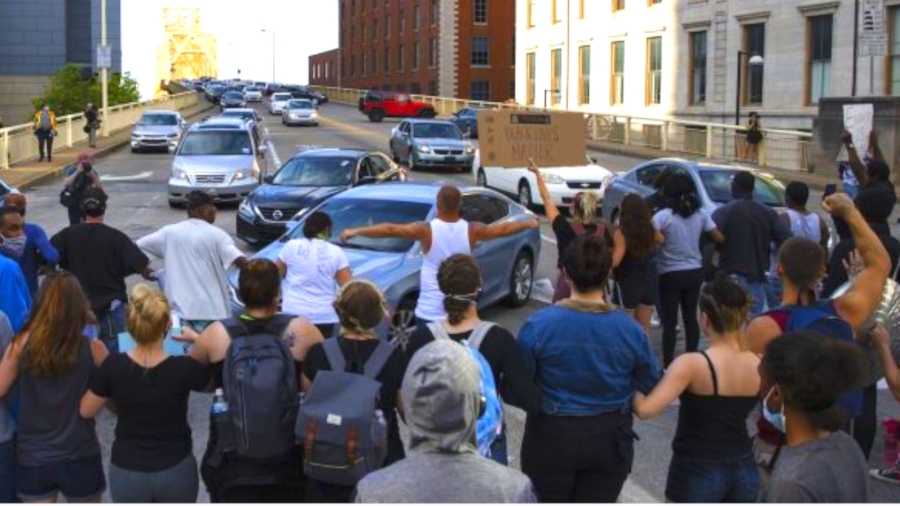Demonstrations over police brutality ended with dozens of arrests after a large crowd of Black Lives Matter protesters blocked a bridge that connects Kentucky to Indiana for several hours, authorities said.
Multiple lanes on the Clark Memorial Bridge, which connects Louisville to Jefferson, were shut down for about three hours on Monday because of the demonstrations, local news agency Wave3 News reported.
Authorities were eventually forced to ask the crowd of demonstrators to disperse, spokesman Lamont Washington told The Associated Press. Washington said dozens of protesters refused police orders and 33 people have been taken into custody.
In addition to the dozens of arrests, protesters used 19 vehicles and interfered with the traffic flow. Tow trucks were notified and the vehicles have been removed from the bridge.
The protests that erupted called for justice in the March shooting death of Breonna Taylor. Protesters could be seen setting up signs and banners with images of Taylor that read: “They tried to bury me. They didn’t know I was a seed. Breonna Taylor. The revolution is now,” Wave3 News reported.
The bridge is one of the only toll-free bridges which crosses the Ohio River and connects Louisville, Kentucky, to Jefferson, Indiana.
Officials in Louisville notified the public that the bridge reopened just before 3 p.m. on Monday. The dispersed crowd of protesters who decided to leave continued their demonstrations at Jefferson Square Park in Louisville, where Tyler Gerth was fatally shot at a protest Saturday.

Gerth was a 27-year-old Kentucky man and an avid photographer and a vocal supporter of the ongoing police brutality protests, The Courier-Journal reported. The suspect, Steven Nelson Lopez, was arrested on Saturday in connection with the shooting. He’s been charged with one count of murder and one count of wanton endangerment in the first degree.
“I am deeply saddened by the violence that erupted in Jefferson Square Park tonight, where those who have been voicing their concerns have been gathered,” Louisville Mayor Greg Fischer said in a statement. “It is a tragedy that this area of peaceful protest is now a crime scene.”
The shooting was at least the second during nearly a month of protests in Louisville over Taylor’s death. Seven people were wounded May 28 when gunfire erupted near City Hall, prompting Taylor’s mother to issue a statement asking people to demand justice “without hurting each other.”
Former Louisville Metro Police Department officer Brett Hankison was involved in the shooting death of Taylor and was fired on June 23. Authorities said Hankison violated procedures by showing “extreme indifference to the value of human life” when he “wantonly and blindly” fired 10 shots into Taylor’s apartment.

Law enforcement officers executed a “no-knock” drug warrant after midnight. No-knock warrants allow law enforcement officials enter a residence forcibly without having to announce their purpose or identifying themselves as police.
Kenneth Walker, the boyfriend of Taylor, fired a handgun which he legally owned, believing the Louisville home he and Taylor shared was being broken into. In the confrontation, a police officer was struck by a round. Police returned fire, hitting Taylor eight times, resulting in her death. No drugs were found in the home.
Following Taylor’s death, Sen. Rand Paul (R-Ky.) introduced a bill to ban no-knock warrants. He said in a press release on June 11 that the bill is named in memory and honor of Taylor.
“After talking with Breonna Taylor’s family, I’ve come to the conclusion that it’s long past time to get rid of no-knock warrants. This bill will effectively end no-knock raids in the United States,” said Paul.
The bill, called the Justice for Breonna Taylor Act (pdf), prohibits any state or local police agency nationwide from executing a warrant “that does not require the law enforcement officer serving the warrant to provide notice of his or her authority and purpose before forcibly entering a premises.”
Isabel Van Brugen contributed to this report.

